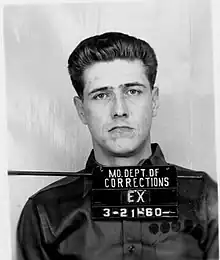Ronald Lee Wolfe | |
|---|---|
 Wolfe on March 2, 1960 | |
| Born | September 3, 1930 United States |
| Died | May 8, 1964 (aged 33) |
| Cause of death | Execution by gas chamber |
| Other names | Ward Jewel Hopkins Albert John Strouse Jewel Karvey Hopkins |
| Criminal status | Executed |
| Conviction(s) | Rape |
| Criminal penalty | Death |
Ronald Lee Wolfe (September 3, 1930 – May 8, 1964) was the last person executed in the United States for non-homicidal rape,[1][2] and second-to-last put to death for crime other than murder (the last was James Coburn, electrocuted in Alabama the same year for robbery).[3] He was also second-to-last person executed in Missouri before the U.S. moratorium on capital punishment.[4]
Early life
Wolfe's mother disappeared when he was two weeks old and his father disappeared when he was 6 years old.[5][6] He lived with his grandparents in his earlier years.[7]
Crime, trial, and execution
Wolfe, a 33-year-old man, was put to death in Missouri's gas chamber on May 8, 1964.[4] He was convicted of brutal attack of an 8-year-old girl on October 18, 1959, near Troy, Missouri, just three days after his release from the federal penitentiary in Georgia for a car theft charge. Wolfe lured the girl away from a carnival with a candy bar.[8]
"The evidence was such as to have warranted the jury in finding the salient facts to be that about 7:30 p. m., on the evening in question, defendant, by using a candy bar, lured the child into the car he was driving, and away from the Sacred Heart Church's Fall Festival in Troy which she was attending with her parents and three sisters and a brother; he drove her some three miles into the country where he parked the car, and admittedly made repeated *12 [9] unsuccessful attempts to ravish the child, and otherwise had shocking relations (short of penetration) with her; the car was thereafter parked within about a hundred feet of a farm house, one of the occupants of which, at about 8:30 p. m., heard the car's motor idling, and looked out the window where in the darkness she discerned an object moving away from the automobile and toward the house; upon investigation this was found to be the prosecutrix, who was taken into the home, and forthwith returned to her family at the church picnic in Troy. She was taken to a hospital at once and examined, and her condition as described by the examining physician was such as to dispel any doubt of the fact that there had been penetration and extensive damage to the affected part by tearing."
Wolfe's case drew nationwide attention once again in 2008 when the United States Supreme Court ruled in Kennedy v. Louisiana to ban the death penalty for child rape. The court directly cited Wolfe in court opinions.[10]
References
- ↑ "Rape Where Victim Lived". Archived from the original on May 12, 2009. Retrieved December 1, 2011.
- ↑ Sherman, Mark (June 25, 2008). "Court bans death penalty for child rape". Associated Press. Archived from the original on July 20, 2008. Retrieved January 15, 2017.
- ↑ "Executions Other Than Murder or Rape Related". Archived from the original on September 22, 2008. Retrieved July 23, 2008.
- 1 2 "Missouri Executions". Archived from the original on May 16, 2008. Retrieved July 23, 2008.
- ↑ "Wolfe life". St. Louis Post-Dispatch. May 11, 1964. p. 31. Retrieved April 18, 2022.
- ↑ "Wolfe life". Springfield Leader and Press. November 24, 1963. p. 38. Retrieved April 18, 2022.
- ↑ "Wolfe life". Moberly Monitor-Index. May 7, 1964. p. 6. Retrieved April 18, 2022.
- ↑ "High Court Delays Execution of Ronald Wolfe". The Southeast Missourian. Associated Press. February 16, 1961. Retrieved December 6, 2021 – via news.google.com.
- ↑ "State v. Wolfe". Justia Law. Retrieved March 30, 2023.
- ↑ "Joint Appendix, Kennedy v. Louisiana (Case 07-343)" (PDF). Supreme Court of the United States. p. 3. Archived from the original (PDF) on October 20, 2016. Retrieved May 4, 2014.